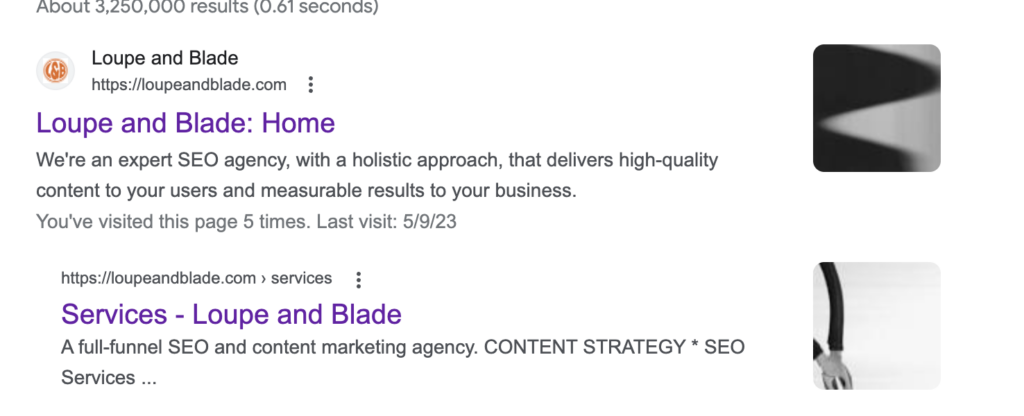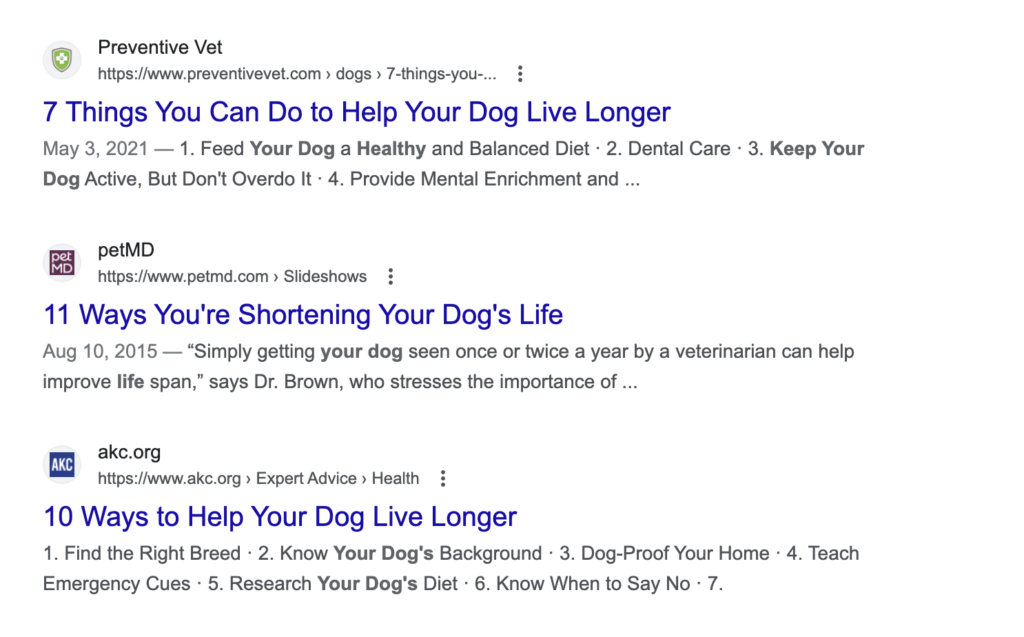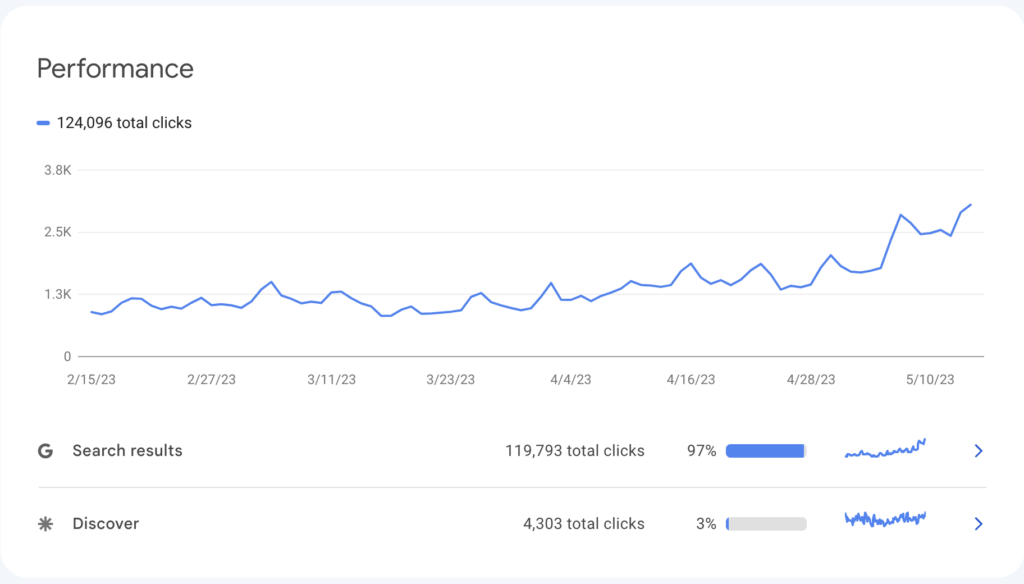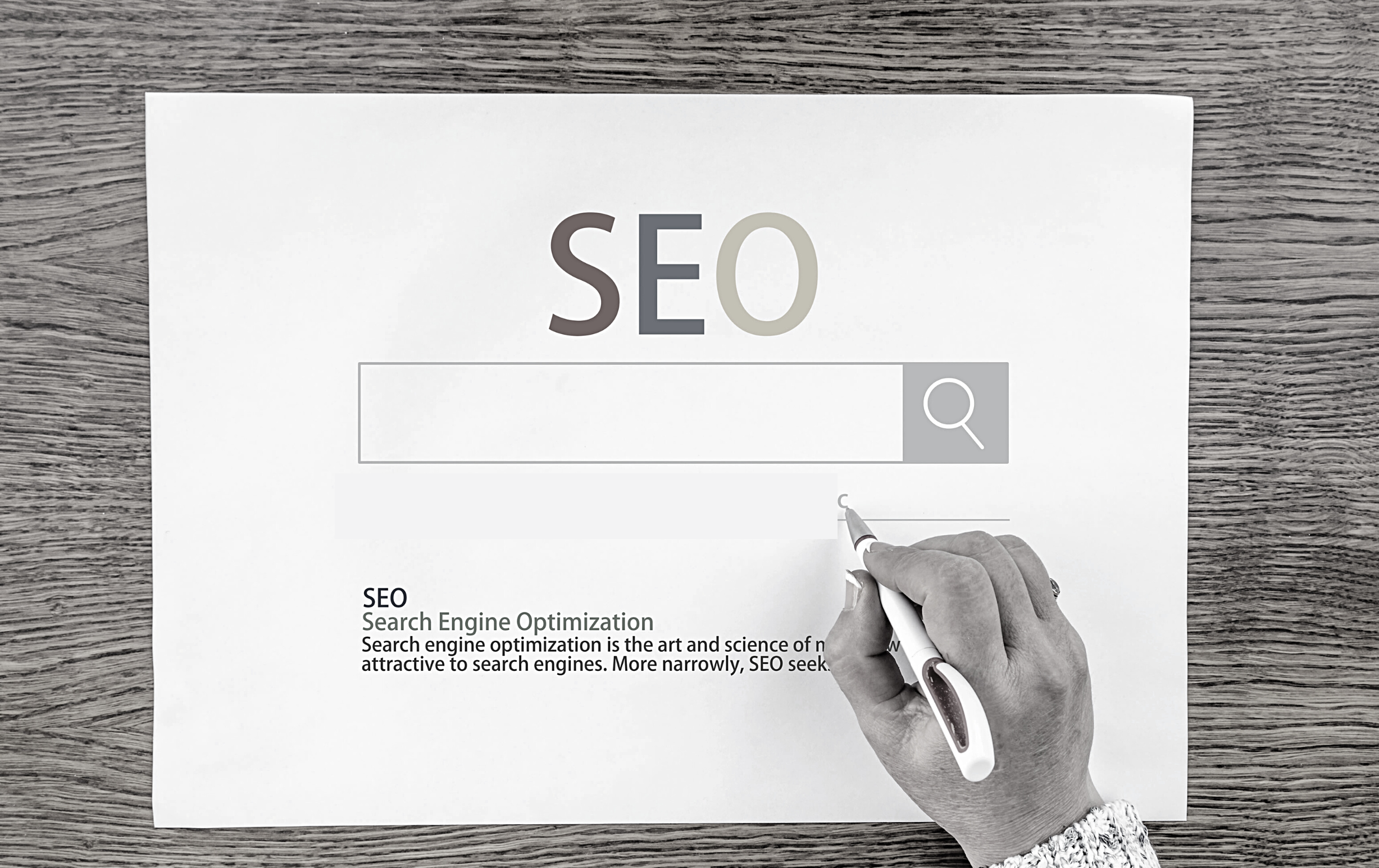How much thought do you put into writing a title for your web pages? If your website comes up at the top of the search results but never receives a click, it’s possible your website has an underperforming title.
How can you grab a consumer’s attention with limited words? Include SEO titles in your SEO strategy to maximize your search result rankings. Let’s discuss the aspects of a good SEO title and provide good website title examples.
What Is an SEO Title Tag?

The first step to writing successful SEO titles is learning what is a SEO title. Page titles for SEO are the writing that shows up in blue underlined print at the top of each search result.
The clickable content is one line that gets right to the point. Will this page offer the consumer an answer to their question? The SEO title should deliver this message.
What is SEO title? It differs from the title of your article – it should be short, contain the primary keyword, and grab attention.
What’s the Optimal Length of a Title Tag?

The SEO title length should be between 55 and 60 characters. If your SEO title is too long, Google will cut it off, and the abrupt cut-off may not be in your favor. Avoid a Google-generated title by following the correct character count. Get creative with what information you can fit into a short title.
Keep the title concise and engaging. For example, if you search “healthy cat food,” you will find examples of good SEO titles:
- The Healthiest Cat Food to Dish Out on a Budget
- How to buy the best cat food, according to veterinarians
- 15 of the Very Best Cat Foods
Scroll down to see an SEO Title Tag that is too long:

Include SEO Title Tags in your strategy that shorten the webpage title to a complete thought. Perhaps a better title would be “A Guide to Healthy Cat Food: Ingredients to Seek Out.”
Without the dangling ellipses, consumers will know what they are getting into when they click on your website. It will also give the first impression that your page is put-together and well-planned.
What Is CTR, and How Does It Affect Your Conversion Rate?
CTR is the click-through rate. If your website shows up on the first page of Google consistently but never receives a click, this is a bad CTR. Impressions are the amounts of time your website shows up on a Google search.
CTR is measured by the number of clicks per every 100 impressions. Even if you have a sound SEO strategy that delivers your website to the first page of Google, it doesn’t matter if no one ever clicks on the page.
You will also have a poor conversion rate if you have a bad CTR. If no one ever makes it to your website, they will never make a purchase.
On the flip side, if you have an excellent CTR of 20% or more, you will drive more traffic to your site and increase your conversion rate. The more visitors to the website, the more overall sales.
How to Write SEO-Friendly Title?
Let’s talk about good strategies for writing successful SEO titles. Look through each SEO title example and consider revamping the titles of each page on your website.
Find Your Primary Keyword
Perform keyword research to find the best primary keyword for your product or service. Tools like Google Keyword Planner and Ahrefs are valuable tools for finding which keywords are oversaturated and which will tap into a new audience.
Use long-tail keywords to discover a market that fits your product. Page title SEO best practices include long-tail keywords to find your target audience. The more specific you can get, the better your chances of bringing customers to your site with the intent to make a purchase.
For example, instead of choosing “cleaning services,” you can narrow down your clientele by including “green cleaning services” or “sustainable cleaning services” as your primary keyword.
Make the keyword even more specific and intriguing by adding “affordable green cleaning services.” Test keywords to find short and long-tail keywords that will engage your target audience while remaining specific to your services.
Where Should You Put Your Keyword in the Title Tag?

*image from Ahrefs
SEO-friendly headlines should include the primary keyword at the beginning of the title. Users immediately see the answer to their question when they read:
- 5 Streak-Free Window Cleaning Tips
- Non-Invasive Orthopedic Treatments for Bad Knees
- Wildflower Photography: Families or Individual Portraits
Minimize the user’s effort by grabbing their attention immediately with the primary keyword. They may skip past your listing if the keyword does not stand out to them.
Should Your Brand Appear in the SEO Title?

Yes, include your brand name in the SEO title. You will always benefit from consumers seeing your name over and over again. If your brand name is short, including it in each SEO title is even easier.
For well-known brands, lead with the brand name in the SEO title so that people see your company and know they can trust the website. Otherwise, tag the brand name at the end of the Title Tag.
Here are some examples of strong SEO titles that include the brand name:
- Fabletics: Activewear, Fitness & Workout Clothing
- Home Chef: Meal Delivery Service – Fresh Weekly Meal Kit
- How to Unclog a Toilet Without a Plunger | HowStuffWorks
Get your brand name out there, especially if it is unknown. If you offer blog articles and guides, let the user become familiar with your reputation by increasing brand awareness in SEO titles.
Use Your Unique Selling Point (USP)

Highlight what users should expect from visiting your webpage that may differentiate your site from competitors. Proving that your company offers a better deal than competitors is always a good idea. Specify the following:
- In-Depth Guide: Many consumers want a one-stop solution. If you can offer an all-inclusive guide, communicate that in your SEO title.
- Quick and Easy Solution: Fast, easy, no-nonsense solutions are just what people may seek in their searches. Tell them about it!
- Affordable: If you have a leg up on the industry and can offer lower prices than competitors, be sure to include that in your Title Tag.
- Listicle Article with Numbers: Grab attention with a number of tips or suggestions so that readers know they can click on your article and skim it for what they need.
- Current and Up to Date: Consumers love to know they are reading the latest and greatest. Use dates in your SEO titles to highlight that the article is modern. For example, “Interior Design Trends for 2023” or “Summer 2023 Pool Party Ideas” will entice readers to click and learn more.
What do you offer that competitors may not? Emphasize those differences in your SEO title. Your USP is essential to utilizing long-tail keywords to deliver better search rankings.
Use Punctuation to Stand Out
add an image(s) from SERP that directly shows the difference.
SEO titles can incorporate punctuation to eliminate connecting words and pique the reader’s interest. Instead of writing complete sentences, segment keywords and brand information using creative punctuation techniques.
Here are some examples:
- Go Nuts (but just a little!)
- A Good Night’s Sleep | National Institution on Aging
- About IV Nutrition | Fast, Safe, and Effective
Fit in more words, get straight to the point, and make the title skimmable with the use of punctuation in your SEO Title Tags. Draw the user’s eyes to your creative SEO title.
Use Catchy Words

When you use words that make the reader excited about clicking on your link, you will see an increased CTR. Capture their attention with words like:
- Free
- Low-cost
- Trusted
- Expert
- Tried-and-True
- Supreme
- Favorite
- Popular
- Trendy
Speak to the consumer in a way that you would share exciting news with a friend. Use words to get them hyped with you. Here are some excellent examples of SEO titles with powerful words.
- 55 Chic Home-Decorating Ideas
- Unique & Cool Electronics & Tech Gadgets
- 4 Easy Ways to Fix Your Oven
Do you see how dynamic language can draw you in and give you the desire to learn more? Implement these power words into your SEO title strategy.
Optimize Your CTR Using Google Search Console Reports

If you are unsure about an SEO title, use Google Search Console to test it. Run a report to find a title that will attract more clicks. Continually using Google Search Console will help you see the metrics needing improvement.
An SEO title is not permanent. You always have the chance to change it to render better results. No SEO strategy is a one-and-done process. Create an SEO strategy that works by being open to changes as the metrics roll in.
What If Google Doesn’t Use My SEO Title?
After 2021, Google released new details for generating titles. They want to reflect the content that the user will see when they arrive on the webpage.
Google generates titles based on the main header information and even adds the website name to the title when applicable. Here are some circumstances that may lead to Google generating a title for your webpage:
- The current title is too long.
- The current title is stuffed with keywords that do not make sense.
- There is no current title, or it is too generic.
Make your own SEO titles for your website pages by adhering to the rules for character length, dynamic wording, and proper branding. Follow the tips we discussed in this article to create an SEO title that will really stand out.
Conclusion paragraph
If you’ve learned anything from this article, it should be that the SEO title for each page on your website is an essential part of your SEO strategy. You can do everything right but have a huge miss in your Title Tag that negates every other step in the plan.
Do not let a page pass by without a dynamic, informative, and brand-inclusive title. Conduct an SEO title audit to ensure all your pages have intentional SEO titles to increase your search rankings.
Lean on the experts to get the job done right. Hire an experienced SEO team to ensure all aspects of your strategy fire on all cylinders.
Have questions about optimizing your SEO titles? Need expert advice on improving your search rankings? Contact us today to speak with our experienced team and elevate your website's performance!

No Comments.